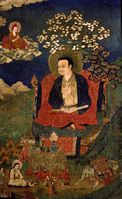Rong zom chos kyi bzang po: Difference between revisions
No edit summary |
No edit summary |
||
| Line 24: | Line 24: | ||
|EmanationOf=bai ro tsa na | |EmanationOf=bai ro tsa na | ||
|BdrcLink=https://www.tbrc.org/#!rid=P3816 | |BdrcLink=https://www.tbrc.org/#!rid=P3816 | ||
|BnwShortPersonBio=An important figure in the renaissance of the Rnying ma tradition in Tibet. His collected works in two volumes include the ''Rdzogs pa chen po’i | |BnwShortPersonBio=An important figure in the renaissance of the Rnying ma tradition in Tibet. His collected works in two volumes include the ''Rdzogs pa chen po’i lta sgom'' ("Instructions on Cultivating the View of the Great Perfection") and a seminal work on sdom gsum ("three codes") ''Dam tshig mdo rgyas''. He was learned in the older traditions based on earlier translations and in the new traditions that spread after the return of the translators Rin chen bzang po and Rngog Legs pa'i shes rab. Traditionally, he is said to be the recipient of teachings deriving from Heshang Moheyan, Vairocana, and Vimalamitra—important figures of the early dissemination (''snga dar'')— and it is said that upon meeting Atiśa Dīpaṃkaraśrījñāna after his arrival in Tibet, Atiśa considered him a manifestation of his teacher Nag po pa (Kṛṣṇapāda). Rong zom instructed many important figures of the day, including the translator Mar pa, prior to his departure for India. (Source: "Rong zom Chos kyi bzang po." In ''The Princeton Dictionary of Buddhism'', 720–1. Princeton University Press, 2014. http://www.jstor.org/stable/j.ctt46n41q.27.) | ||
|IsInGyatsa=Yes | |IsInGyatsa=Yes | ||
|GyatsaNameWylie=paN chen rong zom chos kyi bzang po | |GyatsaNameWylie=paN chen rong zom chos kyi bzang po | ||
Revision as of 14:17, 25 October 2019
| PersonType | Category:Classical Tibetan Authors Category:Tertons |
|---|---|
| MainNamePhon | Rongzom Chökyi Zangpo |
| MainNameTib | རོང་ཟོམ་ཆོས་ཀྱི་བཟང་པོ་ |
| MainNameWylie | rong zom chos kyi bzang po |
| AltNamesTib | རོང་ཟོམ་པ་ |
| AltNamesWylie | rong zom pa |
| bio | |
| YearBirth | 1042 |
| YearDeath | 1136 |
| DatesNotes | The dates 1042–1136 derive from BDRC. Alternative dates of 1012–1088 are given in The Princeton Dictionary of Buddhism (2014). |
| TibDateGender | Male |
| TibDateElement | Water |
| TibDateAnimal | Horse |
| TibDateRabjung | 1 |
| ReligiousAffiliation | Nyingma |
| EmanationOf | bai ro tsa na |
| BDRC | https://www.tbrc.org/#!rid=P3816 |
| IsInGyatsa | Yes |
| GyatsaNameTib | པཎ་ཆེན་རོང་ཟོམ་ཆོས་ཀྱི་བཟང་པོ་ |
| GyatsaNameWylie | paN chen rong zom chos kyi bzang po |
| GyatsaBioStartPage | 518 |
| GyatsaBioEndPage | 519 |
| GyatsaBioStartFolio | 89b5 |
| GyatsaBioEndFolio | 90a1 |
| GyatsaBioTib | །ལོ་ཆེན་བཻ་རོ་དངོས་བྱོན་གངས་རིའི་ལྗོངས་ཙམ་ན་ཕུལ་དུ་བྱུང་བའི་པཎྜི་ཏ་ཆེན་པོ་རོང་ཟོམ་ཆོས་ཀྱི་བཟང་པོས་ཀྱང་ཟབ་གཏེར་འགའ་ཞིག་བཞེས་པར་གྲགས་ཀྱང་བར་སྐབས་ནས་རྒྱུན་བྱུང་མིན་མ་ངེས། ཕྱིས་འདིར་རྗེ་བླ་མ་མདོ་སྔགས་གླིང་པར་མཁའ་འགྲོ་མ་རིགས་བྱེད་རྩལ་གྱི་གསང་སྒྲུབ་ཀྱི་གཞུང་ངོ་མཚར་ཅན་ཡང་གཏེར་དུ་བབས་པ་ཁོ་བོས་ཀྱང་སྐལ་པ་བཟང་པོའི་དཔྱིད་དུ་ནོས་ཤིང་། རོང་པ་ཆེན་པོའི་རྣམ་པར་ཐར་པ་ནི་རྒྱ་ཆེར་ཡོངས་སུ་གྲགས་པས་འདིར་སྨོས་མ་དགོས་སོ། |
| GyatsaBioWylie | lo chen bai ro dngos byon gangs ri'i ljongs tsam na phul du byung ba'i paN+Di ta chen po rong zom chos kyi bzang pos kyang zab gter 'ga' zhig bzhes par grags kyang bar skabs nas rgyun byung min ma nges/_phyis 'dir rje bla ma mdo sngags gling par mkha' 'gro ma rigs byed rtsal gyi gsang sgrub kyi gzhung ngo mtshar can yang gter du babs pa kho bos kyang skal pa bzang po'i dpyid du nos shing /_rong pa chen po'i rnam par thar pa ni rgya cher yongs su grags pas 'dir smos ma dgos so |
| BnwShortPersonBio | An important figure in the renaissance of the Rnying ma tradition in Tibet. His collected works in two volumes include the Rdzogs pa chen po’i lta sgom ("Instructions on Cultivating the View of the Great Perfection") and a seminal work on sdom gsum ("three codes") Dam tshig mdo rgyas. He was learned in the older traditions based on earlier translations and in the new traditions that spread after the return of the translators Rin chen bzang po and Rngog Legs pa'i shes rab. Traditionally, he is said to be the recipient of teachings deriving from Heshang Moheyan, Vairocana, and Vimalamitra—important figures of the early dissemination (snga dar)— and it is said that upon meeting Atiśa Dīpaṃkaraśrījñāna after his arrival in Tibet, Atiśa considered him a manifestation of his teacher Nag po pa (Kṛṣṇapāda). Rong zom instructed many important figures of the day, including the translator Mar pa, prior to his departure for India. (Source: "Rong zom Chos kyi bzang po." In The Princeton Dictionary of Buddhism, 720–1. Princeton University Press, 2014. http://www.jstor.org/stable/j.ctt46n41q.27.) |
| Other wikis |
If the page does not yet exist on the remote wiki, you can paste the tag |

